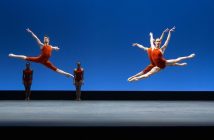Although Alina Cojocaru and Isaac Hernandez had wowed for the official press night two days before, I was almost more excited to be seeing English National Ballet’s Giselle on Friday the 13th; a foreboding date for any performer you might think, especially when not one, but three members of the cast were preparing to make their début in role.
Tipped, shortly after joining the company, as the next Darcy Bussell, and having gone on to prove such hyperbole beyond a shadow of a doubt, it was almost surprising that it was the first time principal Lauretta Summerscales has been handed the title role. As if that alone wasn’t worth buying a ticket for, her leading man, Albrecht, Duke of Silesia, happened to be the Royal Ballet-trained guest artist Xander Parish, the first British dancer ever to join Russia’s Mariinsky Theatre, while fellow guest artist, Michaela DePrince of the Dutch National Ballet was almost certain to be a highlight as Myrtha, Queen of the Wilis, famed for her remarkable energy and for being a role model for black female dancers in the industry, still a minority. The fact that Summerscales made waves with the same role shortly after joining ENB in 2009, was surely a good omen.

Alina Cojocaru as Giselle
Following on from Akram Khan’s acclaimed modern production last year, this 1971 version of Giselle by Mary Skeaping showcases exactly why it has been regarded as one of the most enchanting ballets in the classical repertoire ever since premièring in Paris in 1841. Yet, opening in an idyllic Rhineland village (designed by David Walker), the success of any production entirely rests on finding a female dancer who can make each pivot and arabesque seem effortless whilst appearing as fresh and giddy as a spring lamb, and naïve enough to have her head turned and her heart broken within the course of a day.
Thankfully, after just moments of Summerscales appearing, it was clear that she not only boasts the confidence of a dancer approaching the peak of her career, but possesses an acting ability equal to her technique. Channelling her inner ingénue, Summerscales is so believable as the beautiful yet gullible peasant girl, that you almost think you can perceive her blushes and hear her heart racing when Albrecht, the local nobleman/womaniser woos her. Parish, with his tremendous leaps and haughty Russian posture was meanwhile as convincing a seducer as Summerscales was a blinded adolescent, and despite her mother (Jane Haworth) warning her authoritatively she continued to stumble headlong into the painful and bewildering trap of first love.

Isaac Hernandez as Albrecht
Meanwhile, conductor Gavin Sutherland ensured that the ENB Philharmonic emphasised all the drama of Adolphe Adam’s poignant score; pushing both the vigour and sensitivity of each movement so as to allow the audience to enjoy the suspense of looming tragedy. Nor does the forewarning make it any less shocking or dramatic when Giselle discovers that Albrecht has deceived her and, making full use of the length of the stage, rages wild, pulling her hair in desperation and finally succumbing to heartbreak and death. As the curtain closed on Act I, the murmurings of the audience pronounced Summerscales a fine Myrtha but a remarkable Giselle and they hadn’t even seen the finale.
The second half of Giselle is what most of us will go away remembering due to the deeply romantic score, the atmospheric stage lighting by David Mohr, and the mesmerizing sight of the Willies, a collective of ghostly sprites with fairy wings all dancing in terrific synchronicity. These pale, angelic-looking creatures, dressed all in white tuile, are presided over by Queen Myrtha, and sure enough, DePrince makes for a commanding misandrist ruler whilst displaying great strength in what is a physically challenging role.

Alina Cojocaru and Isaac Hernandez
This mystical world is where Giselle now belongs, momentarily glimpsed by Albrecht after placing flowers at her grave and praying to be forgiven, thus giving Summerscales the opportunity to display her true acting breadth; having evolved from a bounding, excitable youth to a demure, other-worldly being, full of grace and compassion for the man who betrayed her. It looks like Summerscales has been taking acting tuition from Artistic Director Tamara Rojo, for she has undoubtedly raised her game for this production, and ultimately it’s not only brilliant dancing but spellbinding acting like this that makes audiences return season after season. Hauntingly beautiful, this is Romantic-Gothic ballet at its best.
English National Ballet’s production of Giselle at the London Coliseum, St Martin’s Lane, London until 22nd January 2017. Tickets from £14-£79, for more information and to book please visit the website.




